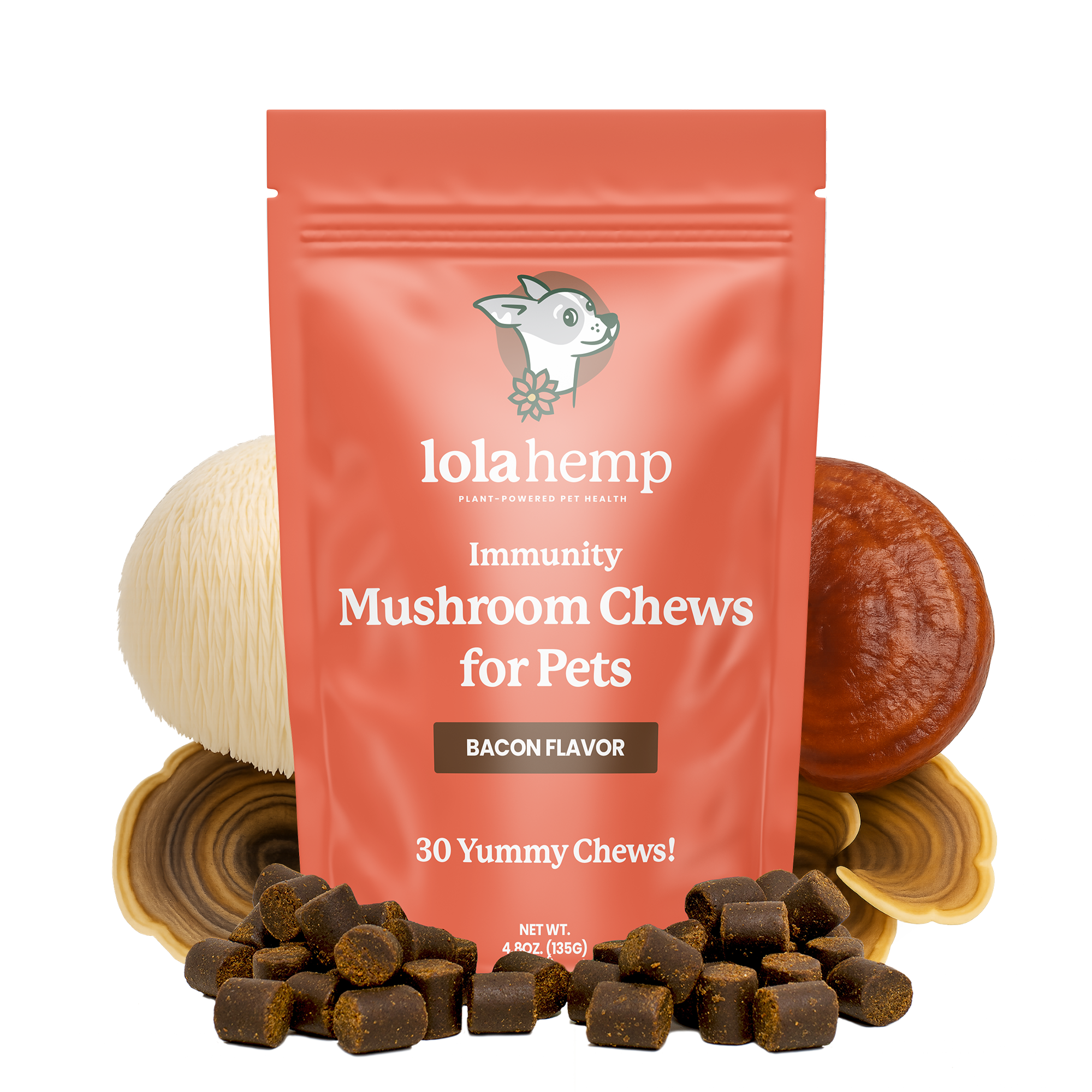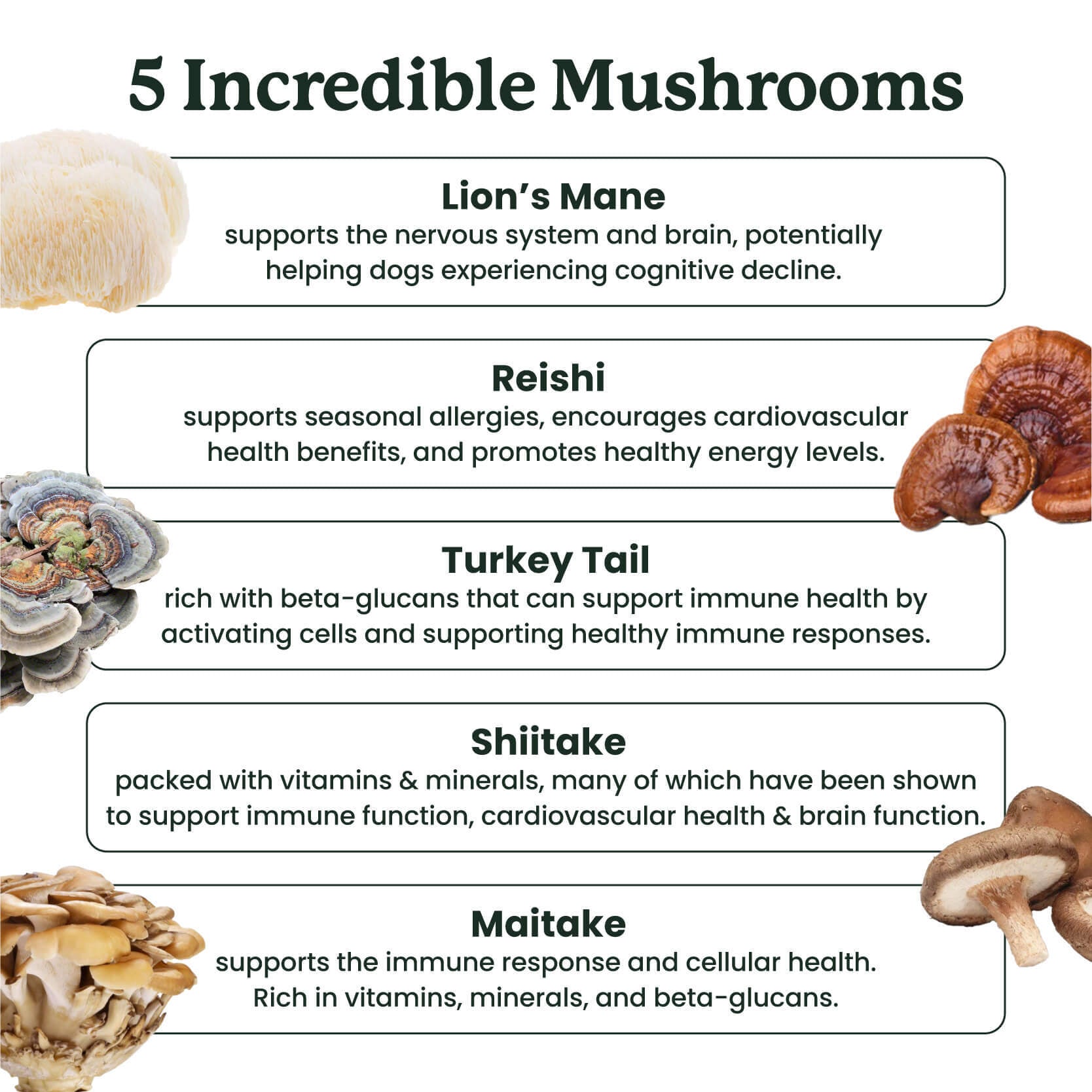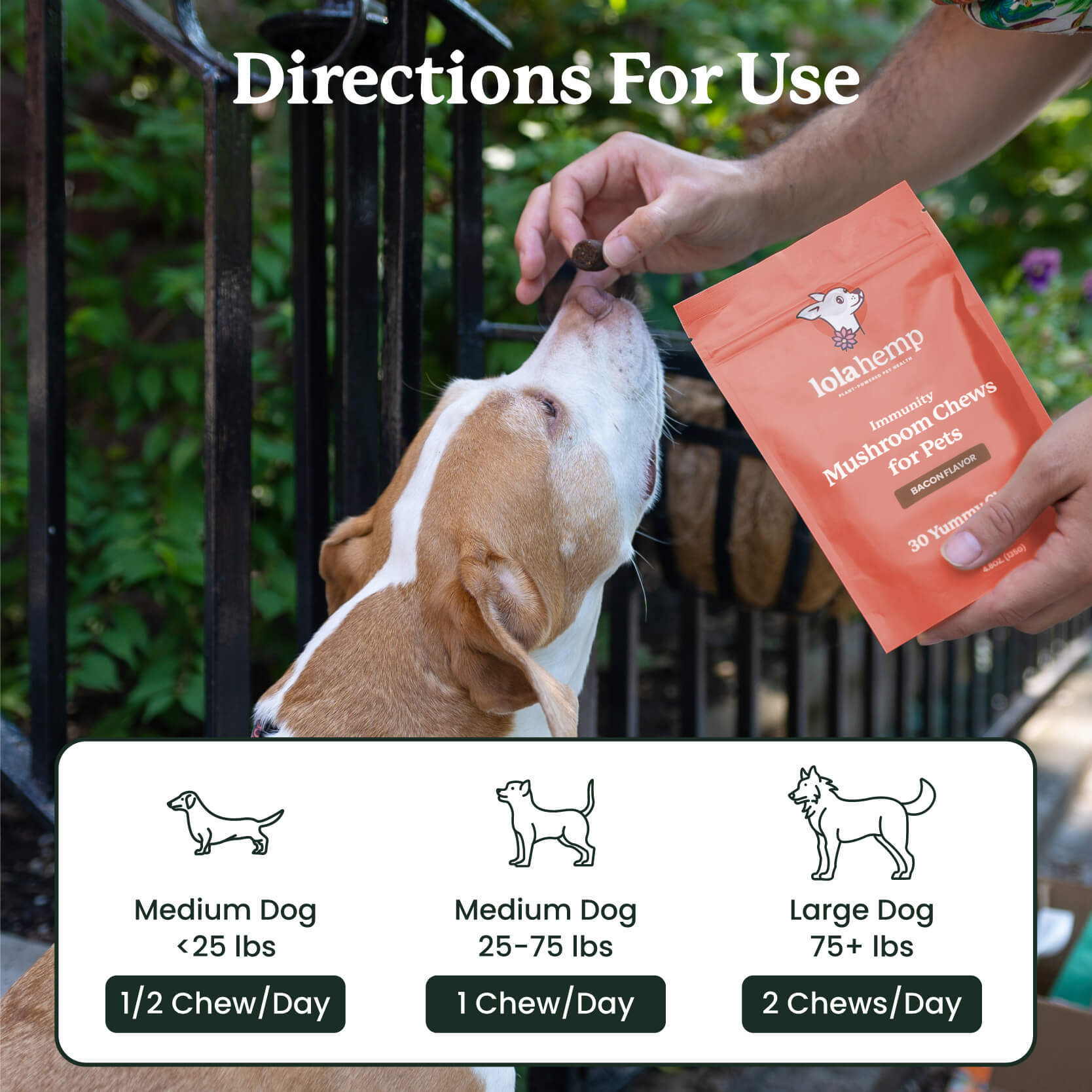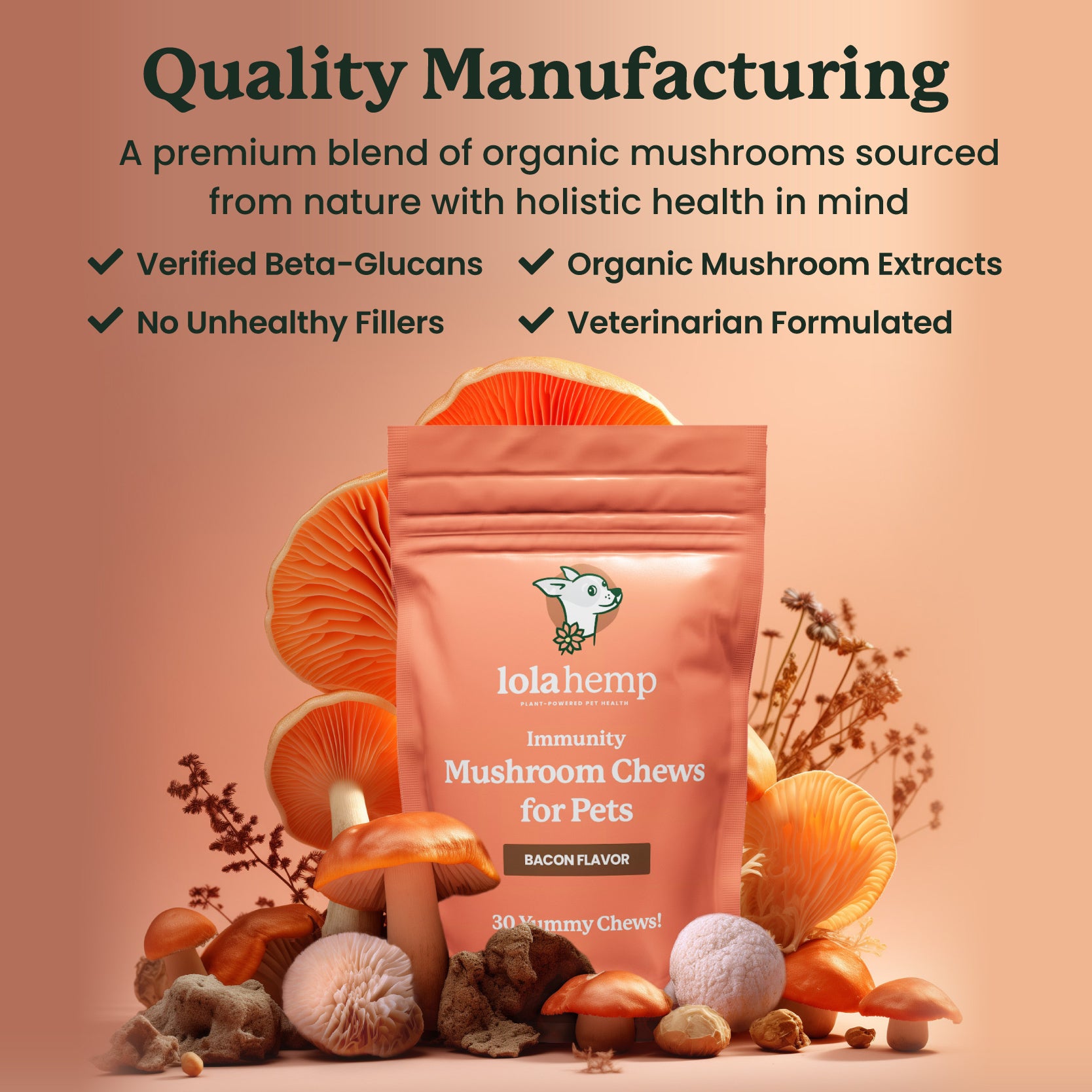Astragalus is a powerful adaptogenic herb that can help dogs strengthen their livers, boost heart health, and can be very beneficial when used in combination with dog-safe mushrooms. Astragalus is a genus containing over 3,000 plants, but the species used for dog health is Astragalus membranaceus.
This article will explore Astragalus's herbal profile, the benefits, dosage, administration, considerations, dog products with astragalus, and precautions of for dogs.
Benefits of Astragalus for Dogs
| Astragalus Benefits for Your Dog |
|---|
Immune System SupportAstragalus is renowned for its immune-boosting properties. A healthy immune system in dogs is crucial for avoiding infections and maintaining overall health. The polysaccharides found in Astragalus may stimulate the production of white blood cells, enhancing the body's ability to fight off pathogens and heal wounds. |
Anti-Inflammatory EffectsChronic inflammation contributes to various health issues in dogs, including arthritis and allergies. Astragalus contains saponins, which possess anti-inflammatory properties, and can help to alleviate discomfort and promote joint health. |
Antioxidant ProtectionThe presence of flavonoids in Astragalus can contribute to its antioxidant effects. Antioxidants play a vital role in neutralizing free radicals, which are harmful molecules that may damage cells and contribute to aging and illnesses such as kidney disease. |
Energetics and VitalityAstragalus has adaptogenic properties, meaning it may help the body adapt to negative health stressors and restore balance. This can contribute to increased energy levels and maintaining vitality in dogs, especially those experiencing fatigue or undergoing recovery. |
Cardiovascular HealthSome studies suggest that Astragalus has cardiovascular benefits. It may help regulate blood pressure and improve blood flow, promoting a healthy heart. This is particularly beneficial for aging dogs or those with heart conditions. |
Respiratory SupportAstragalus has been traditionally used to support respiratory health. In dogs, it can help to alleviate symptoms of respiratory infections or conditions, making it a potential supplementary aid for dogs with a weak respiratory system. |
Anti-Aging PropertiesThe adaptogenic nature of Astragalus, along with its antioxidant content, makes it a promising supplement, potentially promoting longevity and slowing down the aging process in senior dogs. |

Canine Nutrients in Astragalus
There's research to support Astragalus as an adaptogen, immune-booster, antibacterial agent, and gut-supporting herb when used in the diets of dogs.
Astragalus boasts an array of bioactive compounds, contributing to its therapeutic effects. The key constituents include:
-
Polysaccharides: Known for their immunomodulatory properties, polysaccharides play a pivotal role in enhancing immune function. Polysaccharides are also known to offer antimicrobial, antiviral, and possible anti-inflammatory actions.
-
Saponins (Astragalosides): Exhibiting anti-inflammatory and antioxidant effects, saponins contribute to Astragalus's adaptogenic qualities as a stress reliever.
-
Flavonoids: These are antioxidant compounds that help neutralize free radicals, safeguarding cells from oxidative stress.
-
Amino Acids: Building blocks of proteins, essential for various physiological functions and overall health.
Considerations and Precautions
While Astralagus is generally safe for dogs and offers numerous health benefits, the following are considerations and precautions that dog owners should keep in mind to ensure the well-being of their pets:

Consultation with Your Veterinarian
Before starting any herbal supplement, consult with your veterinarian. They can provide personalized advice based on your dog's health history, existing conditions, and potential interactions with other medications.
Correct Dosage
Determining the correct dosage is critical. Dosage recommendations may vary based on factors such as your dog's size, age, and health status. Please rely on the guidance of your veterinarian to ensure your dog receives the appropriate amount for their specific needs.
Quality of the Supplements
Choose high-quality Astragalus supplements from reputable manufacturers. Look for products specifically formulated for dogs and free from additives, fillers, or contaminants that could be harmful.
Monitoring for Allergic Reactions
While Astragalus is generally well-tolerated, monitor your dog for any signs of allergic reactions or adverse effects. These may include itching, swelling, digestive issues, or changes in behavior. If such symptoms occur, discontinue use and consult your veterinarian promptly.
Interaction with Medications
Inform your veterinarian about any medications your dog is currently taking. Astragalus may interact with certain medications, affecting their efficacy or causing adverse effects. Their guidance is crucial to ensure compatibility with existing treatments.
Pregnancy and Nursing
For pregnant or nursing dogs, the safety of Astragalus has not been extensively studied. It's advisable to avoid using it during these periods unless recommended and monitored by a veterinarian.
Underlying Health Conditions
Dogs with specific conditions, such as autoimmune disorders or certain cancers, may require careful consideration when using Astragalus. Its immune-boosting properties may not be suitable for all situations, and consultation with a veterinarian is necessary.
Adaptation Period
When introducing this or any new supplement, start with a lower dose and gradually increase it over several days. This helps your dog's system adapt and allows you to observe for any negative reactions.
Individual Responses
Dogs, like humans, respond differently to herbal supplements. What works well for one dog may not be suitable for another. Pay attention to your dog's response and communicate any concerns or changes to your veterinarian.
Periodic Evaluation
Regularly reassess the need for Astragalus based on the health status of your dog. Periodic evaluations with your veterinarian can help determine if adjustments to the supplementation plan are necessary.
Astragalus Supplement Options
Astragalus should be given to dogs in the form of a vet-approved supplement. It is very difficult to buy or harvest astragalus naturally, formulate it for your dog, and give it to them in reliable dosages.
Instead, opt for products that have been made specifically for your canine companion. One excellent option is Lolahemp's Immunity Mushroom Chew, made with astragalus, colostrum, and an organic mushroom complex intended to support immunity.
The Bottom Line
Astragalus for dogs presents a natural and holistic approach to supporting their health and well-being. With its potent immune-boosting properties, astragalus extends its benefits beyond immunity, contributing to circulatory health by improving liver function and supporting kidney function.
For senior dogs, Astragalus becomes particularly relevant, offering a natural means to address age-related concerns. Furthermore, integrating Astragalus into a dog's diet provides support to the entire body, aiding in maintaining renal function and mitigating the risk of renal failure.
Frequently Asked Questions about Astragalus for Dogs
What is Astragalus used for in dogs?
Astragalus is renowned for its immune-boosting properties and may support vitality, cardiovascular health, respiratory health, and overall well-being in dogs.
Is Astragalus safe for all dogs?
While generally safe, dogs with certain conditions such as autoimmune disorders or those who are pregnant or nursing may require extra precautions and veterinary guidance.
What nutrients does Astragalus provide for dogs?
Astragalus contains polysaccharides, saponins, flavonoids, and amino acids that contribute to its immune, antioxidant, and adaptogenic effects.
Can Astragalus help with inflammation in dogs?
Astragalus contains saponins with anti-inflammatory properties that may help alleviate discomfort and promote joint health.
How should I introduce Astragalus to my dog?
Start with a lower dose and gradually increase it, monitoring for adverse reactions and consulting your veterinarian for appropriate dosage guidance.









